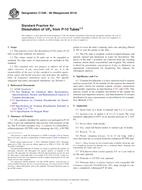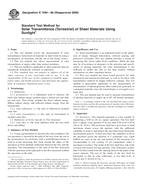1.1 This test method provides procedures for evaluating the thermal endurance of rigid electrical insulating materials. Dielectric strength, flexural strength, or water absorption are determined at room temperature after aging for increasing periods of time in air at selected-elevated temperatures. A thermal-endurance graph is plotted using a selected end point at each aging temperature. A means is described for determining a temperature index by extrapolation of the thermal endurance graph to a selected time.
1.2 This test method is most applicable to rigid electrical insulation such as supports, spacers, voltage barriers, coil forms, terminal boards, circuit boards and enclosures for many types of application where retention of the selected property after heat aging is important.
1.3 When dielectric strength is used as the aging criterion, it is also acceptable to use this test method for some thin sheet (flexible) materials, which become rigid with thermal aging, but is not intended to replace Test Method D1830 for those materials which must retain a degree of flexibility in use.
1.4 This test method is not applicable to ceramics, glass, or similar inorganic materials.
1.5 The values stated in metric units are to be regarded as standard. Other units (in parentheses) are provided for information.
1.6 This standard does not purport to address all of the safety concerns, if any, associated with its use. It is the responsibility of the user of this standard to establish appropriate safety and health practices and determine the applicability of regulatory limitations prior to use. A specific warning statement is given in 10.3.4.
Product Details
- Published:
- 10/01/2010
- Number of Pages:
- 7
- File Size:
- 1 file , 120 KB
- Redline File Size:
- 2 files , 250 KB


